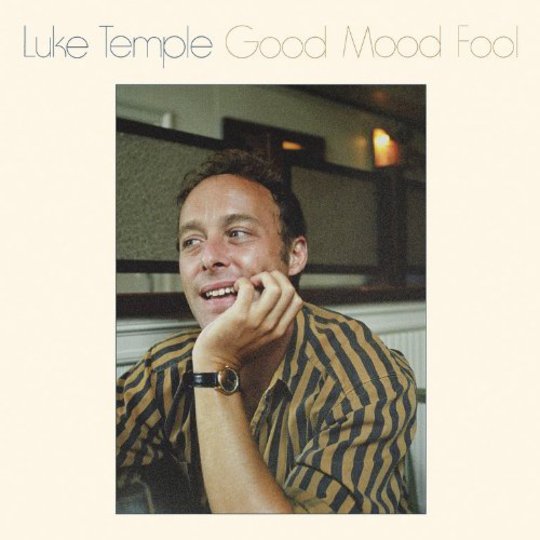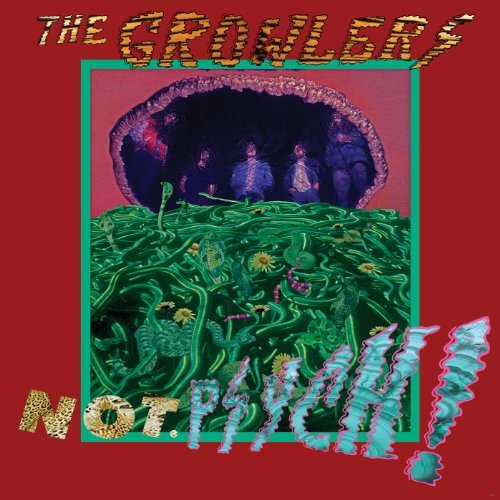Luke Temple has a history of country-tinged solo records, songs sometimes knowing, sometimes pleasantly worn and maudlin, with his bigger statements expressed via his band Here We Go Magic. Last year’s jittery, krautrock-leaning A Different Ship was even produced by THE Nigel Godrich, who’s a fan. But Good Mood Fool is a very different proposition, guitars sidelined in favour of synths, which sometimes take on a neon, garishly Eighties glow. Everyone has their guilty pleasures that sometimes demand expression (when provoked, your humble reviewer once all but got into a fist fight defending Barry White’s place as a visionary in the canon of soul artists). Still, few would’ve seen this coming.
The glossy surfaces suggest that the record is a fun experiment; a bit of fluff knocked out while HWGM is on hiatus. In this light it’s aptly named too - the result of candyfloss impetuousness, a joke taken too far, with treatments so retro you’re tempted to think Temple still carries a phone the size of those rubber bricks found at the bottom of swimming pools. ‘Katie’ shows he’s got the Top Gun soundtrack saved on Spotify, and you’d be forgiven for thinking that Kenny Loggins has parachuted in. All chorus from the off and sung in preening falsetto, it’s charming with its hyperactive drum padding, as is ‘Florida’, which rides cappuccino synths and delicious coiling bass before retiring itself in a reverie of fluttering woodwind. The instruments often feel pixellated.
Temple’s suddenly an urbane lothario: no fewer than three songs have women’s names for titles, with vocals recalling the smooth timbre of Paul Simon cooing at his moustachioed AOR peak. ‘Jessica Brown Findlay’, a daydream about an exotic air hostess, is weirdly wonky, blending its esoterica like a badly pre-mixed cocktail: doo-wop backing counterpointed with a skittering two-step beat, Temple drawling “but your face is a heartbreaker”. If that’s not enough, it’s rounded off with a keyboard wig-out that’s part whiskey-jazz, part sitcom theme. Repeated snatches of samples, as if found on an old dictaphone, also feature prominently, such scrapbooks of sound recalling David Byrne and Brian Eno’s My Life in the Bush of Ghosts. The seed’s then planted: maybe this isn’t just fun.
Once the surface is scratched, Temple’s keen social conscience - something not usually noted in his work - is found bubbling below. The treatments, rather than being kitsch, then help to hit the ideological payloads home, and the record’s manifesto unfurls as it goes on. It starts small. ‘Those Kids’ - with choppy, hummingbird guitar and parps of brass - lampoons the received 'the public wants what the public gets' wisdom of the tragic marketing suit selling to adolescents, who, a refrain constantly reminds, are actually “not such idiots”.
‘Terrified Witness’ tackles the spectre of nuclear war, an explosive vortex of static ushering in a strolling dub that namechecks President Truman, with the implication of the destruction (“150,000 in the blink of an eye”) being that many decent American citizens are the titular dumbfounded onlookers as much as the survivors. ‘Love Won’t Receive’ highlights the blight of mass shootings on American society, and even if it’s lyrically clunky (“Feel so bad for you mothers”, “all our children in a pile”) the sentiment is sound.
Framing also helps messages connect, and the record is bookended by contrasting sister songs. ‘Hard Working Hand’ is a first person examination of the drab theatre of office life and the daily commute many of us know (“probably give my seat to the lady but I probably need it more”), the song a Casio keyboard demo that deconstructs itself. Yet it’s made to seem little more effort than flipping on a light switch compared with ‘The Hardest Working Self Made Mexican’. Illuminating the situation of a disposable society propped up and enabled by prodigiously motivated immigrants it treats absymally - “he doesn’t need you like you need him” - and sung over beatific synth, it’s a genuinely thought provoking closer. If only Botoxed Californian housewives too lazy to empty their own bins could hear it.
A world away from Temple's previous records, Good Mood Fool is a mixed bag in that’s revisionist in approach, but somehow topical. There’s much to recommend. It’s just a tad jarring due to its aim - in keeping with progressive soul records of the Seventies - of having a concept or song cycle doesn’t naturally chime with the adoption of the music of Temple’s youth, which is placed a little later. It’s the sound of someone getting the kinks out of the system rather than incorporating old influences seamlessly into a new sound. Still, the final verdict? Very decent.
-
7Matt Langham's Score






















